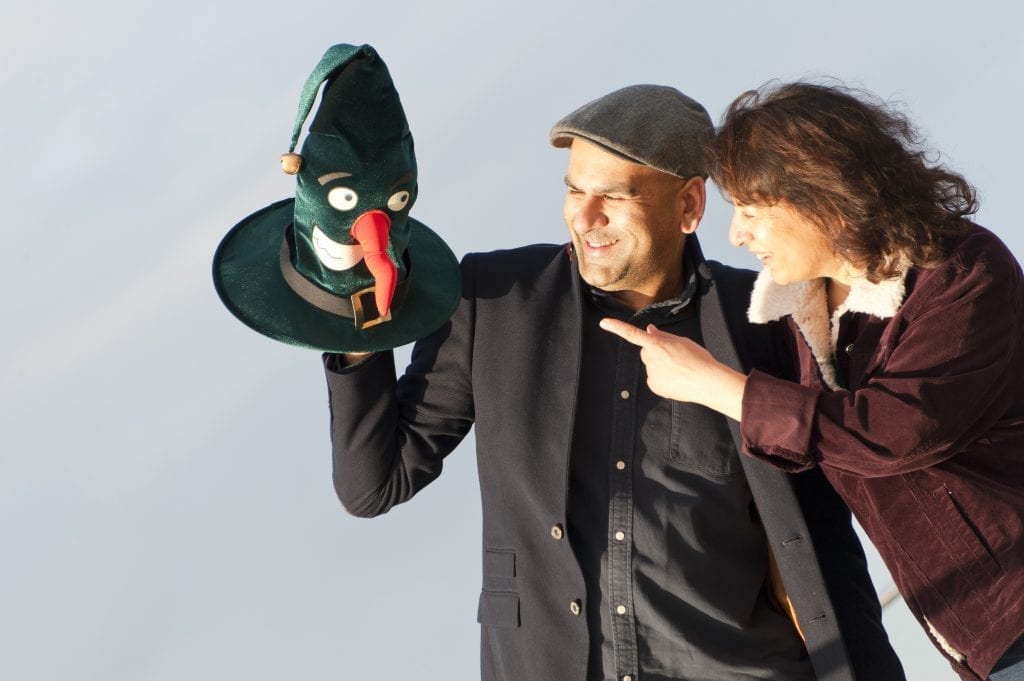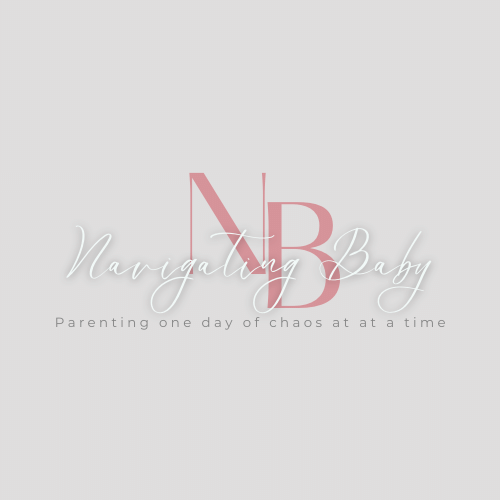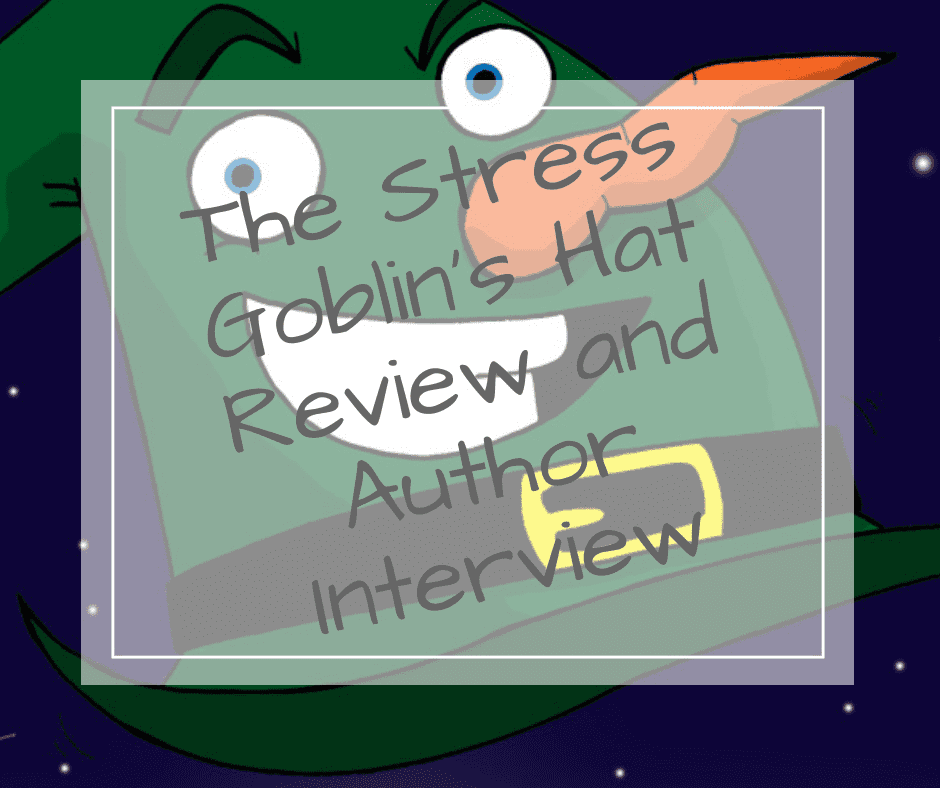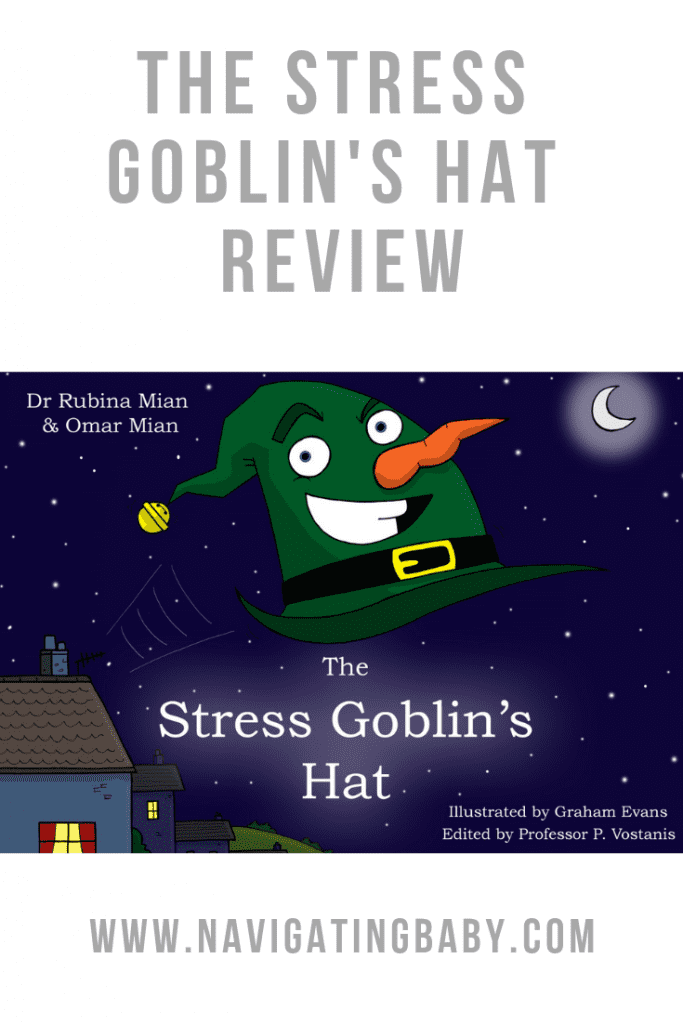The Stress Goblin’s Hat Review
Recently we were sent a copy of the Stress Goblin’s Hat by Dr Rubina Mian and Omar Mian. The book is intended to help young children understand stress and how it could be affected them. The book was sent to us at a perfect time as my eldest son was waking up every night and saying that he was having nightmares, but we couldn’t seem to get him to articulate why. I was hoping reading this book with him would help.
When I first read the story with him I thought it might be a bit simple for him, but no! It was amazing! He totally connected with the story and the content and was able to relate it back to himself easily. After reading the story I used the section for adults that is that at the back of the book to help me with instigating discussion. I was so surprised about the effect this book had on him. He was able to tell me what was causing him concern (an irrational fear that someone would break into our house) and associate the tummy ache he was having a bed time with that fear. As a result my husband and I were able to show him the security measures we have in place and give him the reassurance he needed. Last week was children’s mental health awareness week and as he got so much out of the story he also has been talking about it at school. The publishers were kind enough to also send us a copy to donate to my children’s primary school and my son was so excited to tell his headmistress all about the Stress Goblin’s Hat and what he learnt from it.
The book itself is a lovely one to read with your kids as the illustrations are bright and colourful and interesting for little kids and the story is lively and made my kids giggle as the Stress Goblin’s Hat caused havoc around the place. This is a book that is now a firm favourite in our household and is right up there with the most requested bedtime books. I would absolutely recommend this book to anyone who has a child that feels anxious about things or who has trouble expressing what is bothering them. We loved it!
Author Interview
I was also able to interview the authors and get a bit more information about the thoughts behind the book and how it can help children and their parents manage stress.

Photo Credit: Graham M Lawrence
What inspired you to write the Stress Goblin’s Hat?
We’ve witnessed first hand the devastating impact stress can have on young lives. We are passionate about improving children’s healthcare and lives. Children are very vulnerable to stress. They haven’t yet learnt the skills to handle it, and can’t simply walk away from a situation. There is information out there for grown-ups but very little for both children and their grown-ups.
So, we wrote a fun fairy story with lots of vivid coloured illustrations. There is, also a serious section for the grown-ups at the back of the book edited by Professor Vostanis one of the world’s experts in children’s stress.
Where did the idea and the character of the Stress Goblin’s hat come from?
Well, we were sitting on top of an open top double decker bus in Dublin, and sudden gust of wind blew my brother’s hat off! It not only lifted off, but swirled and turned and appeared to dance.
In your experience do you think Children are suffering with stress more these days?
I think stress has always been around, but we are now better equipped at recognising it and the havoc it can cause and we are better at reporting it.
If yes then why do you think this is?
There are additional problems that young children face in today’s era that include relentless exams, online bullying and bullying through social media. All these are relatively new problems that certainly don’t help.
What can the impact of too much stress be on young children?
The statistics are frightening. 1 million children aged between 5-15 suffer from stress related problems. There can be physical, emotional, developmental and educational problems.
I read the book to my 3-year olds and my 7-year-old. They all loved it, but the discussion about stress was most successful with my 7-year-old. Do you have any suggestions for how I could better use the book with my younger children?
Engaging with younger children is the key. Spark the conversation. Although they may not understand everything that’s going on, with time the story will mean more to them as they develop both emotionally and mentally. Early engagement from a young age sets the tone for future. For a 3 year old, Hat is just a funny character that makes everyone do odd and sometimes funny things. And that’s fine for a 3 year old. Use the pictures and simply point out what’s happening, Talk to the 3 year old and ask them what makes them happy. It may be a particular song, TV character, toy or security blanket and help them reach for this when they appear stressed.
Indications that a child may be stressed.
It is worth keeping an eye out for any changes in a child’s routine such as sleep (delaying going to bed, late in getting off to sleep, waking in the middle of the night, complaining of nightmares). Here are some pointers:
- A child can look sad, withdrawn or irritable.
- They may complain about physical symptoms such a tummy aches. It is important to first exclude a physical health cause and not to challenge the child as they are not making symptoms up. Consult your G.P.
- They may avoid going to school.
- They made avoid activities and food they usually enjoy
- They may look angry or have outbursts without a clear reason.
- They may overreact to minor problems, become clingy or have drastic changes in academic performance.
- Most of the time a child who is stressed will present one or more of the above problems.
How can we help our children manage stress? Can you share some practical strategies?
Stress is about perception. Once put into context, children will realise that many of the situations (such as tests, making new friends etc) although very real to them can be handled and controlled. Professional counselling needs to be brought in when appropriate, but for everyday stressors , talking to your child is the key.
If you had to give a pep talk to my readers whose children might be experiencing stress it would be:
We all get a little stressed from time to time. That’s perfectly normal. Stress becomes a problem when it starts to get in the way of day to day life, when it’s not short term and it’s not just an occasional thing. Severe stress can harm children’s mental and emotional well being. The key is to talk to children and use story telling and characters to explain stress. For example in ‘The Stress Goblin’s Hat’ ask if they have ever felt the Stress Goblin’s Hat land on them? How did they feel? Did their heart beat faster? Did they feel hot? Did they cry? Were they upset?
If there was one tip you could give parents for helping their children deal with stress what would it be?
Ways of dealing with stress vary with each circumstance and each child. For example an activity that may be therapeutic for one child and may cause anxiety in another
Top general tips for children to deal with everyday stress:
Downtime
Don’t over schedule extracurricular activities. Allow children time to talk and unwind. Ask them what worries them. Discuss their fear and worries.
Play
Allow children to play without pressure. Combine with outdoor activities for example simple activities like riding a bike, exploring the outdoors.
Make Sleep a Priority
Sleep is essential. Create an environment that facilitates sleep. Keep electronic devices, mobile phones and TV out of a child’s bedroom. Reduce exposure to blue light from electronic devices. Consider blackout curtains.
Listen to their body
Teach children to listen to their bodies. For example explain it is perfectly normal for our hearts to beat a little faster when we encounter new experiences or a balloon bursting.
Fear of making mistakes
For many children a great deal of stress comes from fear of making a mistake or letting their parents down. Help children understand that it’s okay to make a mistake. Parents and teachers should be aware that children pick up on their fears and anxieties and it’s best to manage these in a consistent way.
If you feel your child is suffering from a high degree of stress or an anxiety disorder consult your GP who may refer you to a specialist. For bereavement & suicidal thoughts consult an expert immediately.
Anything else you’d like to add?
Each child is different and what stresses and de-stresses a child will be as individual as the child. An adult engaging with a child to help them figure out what’s causing the stress and a possible solution is a good approach to take. Explore what makes your child feel better? Hobbies? Sports? Exercise? Music? Dance? Games? What are their favourite smells? Familiar childhood smells associated with good experiences can relieve stress. For example in the West the scent of vanilla or childhood sweets is often found to be calming. Favourite foods, sounds, people, TV characters, comedy, cartoons and jokes are just some of the things that can help take stress away. Research has shown that laughter can reduce stress levels and can even boost the immune system. It’s worth exploring what works for your child. Never underestimate the power of fun.
This is not intended to be medical advice. If you have any concerns consult your GP or expert practitioner
Finally, where can my readers buy a copy of the book?
The book is available in all good bookshops, Amazon, or directly from Hairy Nostril Productions www.hairynostril.com








So good to embody and personify stress so a kid can get a handle on it, talk back to it, and even learn to pray against it.
This book sounds like it would be perfect for my grandsons (ages 4 and 7). I will have to see if I can find it. Thanks for the recommendation.
I am sure it would be. I appreciate you being on the #DreamTeam
Great review. My 3 year old is currently fixated on whether we are ‘happy’ or not. She always asks us if we are happy?! This book may be for us! #DreamTeam
Oh bless her! I really can’t rate this book highly enough. It has been great for us.#DreamTeam
this book sounds great, my four year old daughter is going through a phase of having nightmares, and is still sleeping in with me actually. she just doesn’t like being on her own in the night time! i’m not pushing it, but was looking at ways to deal with it. i’ll check this book out. #dreamteam
Definitely do. I really have found it a useful resource. Thanks for being on the #DreamTeam
Great topic and great to hear that there is such playful help out there to help kids – sounds like a fab book! #dreamteam
It really is! Thanks for being on the #DreamTeam
I love that there is a portion for adults that helps with discussion between a child and an adult. That is a big deal, and with a topic like this, that anyone, of any age can deal with, conversation is key! #dreamteam
It is a really great resource that we now use regularly. Thanks for being on the #DreamTeam
What a great resource to have on your bookshelf. Kids have stress too! #dreamteam
Absolutely! Thanks for being on the #DreamTeam
Sounds a really fun book, i like the drawings as well X #dreamteam
It really is a lovely book. Thanks for sharing with the #DreamTeam
I think this is a great book. my kids are probably too old for it now but a great way to help kids understand stress or anxiety. i’m all for books with a positive message x #dreamteam
Yes probably. I think they say aimed at up to 8 years old. Thanks for being part of the #DreamTeam
What a fantastic idea for a book! sometimes we struggle to get our words out or know what to say when trying to help a child, this is great tool to use.
Thank you for sharing your review #dreamteam
I really did love this book. Thanks for being on the #DreamTeam
poor darling worrying at night, I used to worry and have nightmares so much as a childI still remember the RECURRING ones vividly. I seem to have been lucky with my children, but my poor nephew suffered badly from nightmares. A book with a parent help section is a fabulous idea, I am glad they gave one o your sons school too as so many kids suffer from this stress. #DreamTeam
I know. Poor thing. I used to worry as a child so I know how he feels at least so I can try to support him but it makes him tired then so he is grumpy too
This sounds so awesome! I’m going to get a copy for my nieces and my nephew! #DreamTeam
It is really a very good book. #DreamTeam
This book sounds brilliant. i LOVE HOW IT SPECIFICALLY TACKLES STRESS IN CHILDREN AND HELPS PARENTS TO UNRAVEL THINGS.We’ve got something similar with bedtime worries – i’LL HAVE TO CHECK THE BOOK OUT! tHANKS FOR BEING A FAB #DREAMTEAM HOST XXX
I really did think it was fab and my worrier always requests it so I know when he is dealing with something. #DreamTeam
Nightmares are such a pain. Mine have all suffered with some recurrent ones. My youngest son gets quite anxious, so this would be helpful for him #dreamteam
I really suffered with nightmares when I was a kid so I know how they can impact you and now as a parent getting woken in the night is no fun. Thanks for being with us on the #Dreamteam
This post was so insightful and really taught me so much about stress in children. It has Made me wonder Ifnmy son may be stressed as he is having lots of bad dreams later. This book is kne dor every childs bookshelf i think xx #dreamteam
I totally agree – a must for all little kids. I hadn’t really thought about it too much before my son started having nightmares, but since getting this book we have used it for discussion triggers so many times and it really has made a difference with my eldest who is quite anxious about things. Thanks for being on the #DreamTeam
Sounds like a great idea for a book – lovely illustrations too #DreamTeam